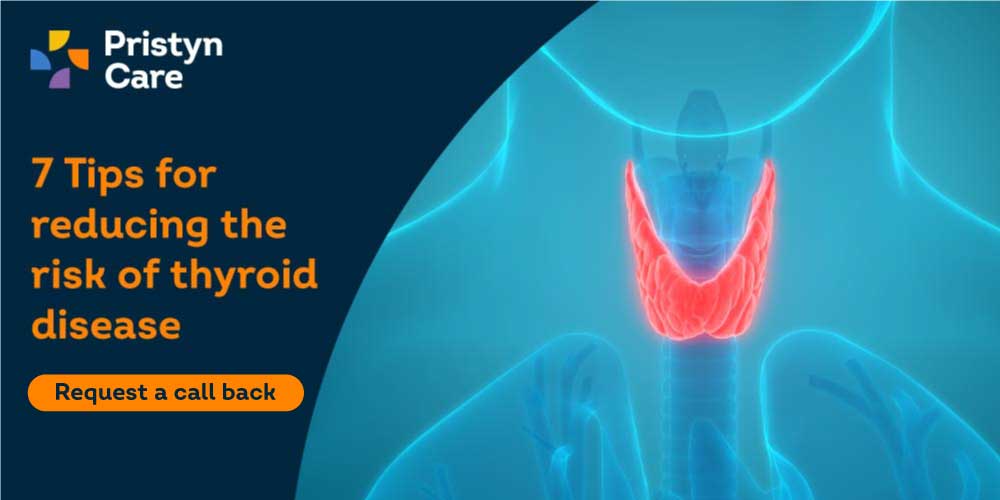
Thyroid disease is one of the most common health issues all over the world. Generally, most benign thyroid issues occur due to the dietary unavailability of iodine, one of the primary components of thyroid hormones. Almost a third of the world’s population lives in iodine-deficient areas.
Benign/autoimmune thyroid disorders from iodine malnutrition range from primary atrophic hypothyroidism to Hashimoto’s thyroiditis to thyrotoxicosis caused by Graves’ disease.
Generally, hypothyroidism (low thyroid levels) is 10 times more common than hyperthyroidism (high thyroid levels), and both conditions occur much more commonly in women. There are various preventive measures that can be taken to reduce the risk of thyroid disease.
Preventive measures for thyroid disease
- Take precautionary measures while getting X-rays
Ask your radiologist for a thyroid collar, especially if you are getting dental x-rays or x-rays that involve the head, spine, neck, or chest that increase the exposure of the thyroid to radiation. A thyroid collar completely covers the neck region during X-rays.
- Stop tobacco consumption, especially smoking
Tobacco, especially cigarette smoke, contains toxins like thiocyanate that can disrupt the iodine absorption process and thyroid hormone formation, leading to thyroid disease. If you need, you can use nicotine patches or get tobacco-cessation counseling to stop smoking.
- Check your thyroid regularly
You should stand in front of a mirror and feel around your neck region to check for hard lumps or swelling. While most deep or small nodules can’t be felt, it is very effective for superficial nodules/swellings.
You can find your thyroid gland in the front of your neck, between the collar bones (and Adam’s apple in men). Tip your head back and take a drink of water while your head is tilted. Watch your thyroid gland as you swallow and look for lumps or bumps.
- Take care of your diet
Diet is an important part of thyroid disease prevention. According to some research studies, soy products can lead to thyroid issues. Celiac disease (gluten intolerance) is also three times more common in people with thyroid disease, so you should get diagnosed and treated immediately if you have signs of gluten sensitivity or celiac disease.
- Get regular health checkups
Often, most patients aren’t able to discern the initial signs of thyroid disease. Regular health checkups with your primary care provider make it easier to diagnose and manage thyroid diseases in the initial stages.
- Take supplements, if necessary
Some vitamin and mineral supplements help absorb iodine more easily and help thyroid function. One of these is selenium, a mineral that reduces the risk of thyroid disease drastically, especially after childbirth. Another supplement that can be very helpful in preventing thyroid disease is potassium iodide (KI). However, KI can also worsen existing thyroid symptoms, so you should only take it if instructed by your endocrinologist/healthcare provider.
- Make sure your drinking water is pure
Nowadays, underground water is high in minerals, like fluoride and percolates, that increase the risk of thyroid disease by blocking iodine absorption by the thyroid. If you are not using a water purifier, you should get your drinking water tested and get one if you need one.
- Follow a healthy lifestyle
A healthy lifestyle with a balanced diet and plenty of exercise helps the body function more optimally and helps reduce the risk of thyroid disease and dysfunction in future.
Early signs of thyroid disease
If you exhibit the signs of thyroid disease, you should consult a doctor immediately to begin your treatment. Delaying the treatment can make it hard to manage the condition medically or even result in permanent damage to the patient’s body in some cases.
Some early signs of thyroid disease you should look out for are:
- Neck swelling or goiter
- Fatigue and muscle weakness
- Increased sensitivity to cold or hot temperatures
- Constipation
- Dry skin and facial puffiness
- Unintentional weight gain
- Hoarseness
- Rapid, irregular, or pounding heartbeat
- Irregular or increased appetite
- Nervousness, anxiety, and irritability
Management of thyroid disorders
Most patients are able to manage benign thyroid issues using medications like radioactive iodine, antithyroid drugs, radioactive iodine, beta-blockers, thyroid replacement hormones, etc. However, the patient may need thyroid removal surgery (thyroidectomy) for relief in severe cases. Generally, the amount of thyroid tissues to be removed depends on the severity and type of thyroid dysfunction.
Based on the given factors, the patient’s thyroid surgery can be total thyroidectomy, partial thyroidectomy (thyroid lobectomy), sub-total thyroidectomy, or thyroid isthmusectomy. Consult a thyroid specialist or endocrinologist right away if you are exhibiting signs of thyroid disease to avail the best treatment for you.






